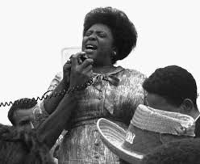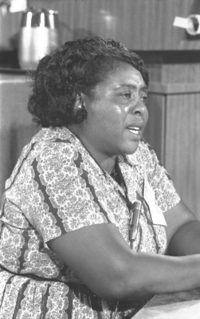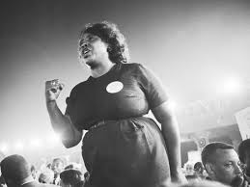Fannie Lou Hamer: Tireless, Inspirational Civil Rights Activist
One of the American Civil Rights movement's unsung champions was Fannie Lou Hamer, whose pursuit of the right to vote helped bring attention to the still large gulf between black and white in America. She was born on Oct. 6, 1917, the youngest of 20 children. Her parents, James and Lou Townsend, were cotton sharecroppers in Mississippi. Fannie Lou started work in those cotton fields when she was 6. By the time she was 12, she found it necessary to stop going to school and work full-time, to help support her family. When she was in her early 20s, Fannie Lou married Perry "Pap" Hamer; the couple worked on a cotton plantation near Ruleville. The Hamers found themselves unable to have children, ultimately made impossible by a forced removal of Fannie Lou's uterus without her consent when she was in the hospital for an unrelated procedure. 
On Aug. 31, 1962, as the Civil Rights movement was ramping up, Fannie Lou Hamer attended a protest meeting organized by the Student Nonviolent Coordinating Committee (SNCC), where she met other civil rights leaders; from that meeting grew in her a desire to campaign against race-based injustice. She was part of a group who marched into the county courthouse with the intent of registering themselves to vote. Of the 17 people who tried, only two got far enough inside the courthouse building to fill out a registration form and take the required literacy test. Hamer was one of those two; both of them failed the test. Many states at this time had either laws that prohibited African-Americans from voting altogether or barriers, such as a literacy test, that proved insurmountable for many. The group had traveled by bus from their homes in and near Ruleville to Indianola, the county seat. On their way home, they found themselves stopped by the side of the road as the bus driver was arrested for driving a bus that was, in the words of the officer who stopped the bus, "too yellow." The arresting officer issued a fine on the spot, and everyone on the bus had to contribute money to pay the fine so they could get home. When Hamer returned to the plantation, she found that she didn't have a job anymore. W.D. Barlow, the plantation owner, had been informed of Hamer's application to vote and demanded that she withdraw it; she refused, saying, "I didn't go down there to register for you. I went down to register for myself." Barlow ordered Hamer to leave. Undeterred at the forced removal, she dedicated her life's work to advancing possibilities for African-Americans. She went to work for the SNCC, attending protests and enduring threats and violence. She was arrested several times and, during one stint in jail, was beaten so badly that she suffered permanent kidney damage. Unbowed, she continued her campaign, helping form the Mississippi Freedom Democratic Party, just in time for the 1964 elections. One motivation for the founding of this party was to offer the national Democratic Party something more than the all-white delegation that the State of Mississippi had decided to send to the national convention in Atlantic City, N.J. 
She attended the convention and gave a memorable speech, describing the race-based brutality that had been her life, saying, in part, "I question America. Is this America, the land of the free and the home of the brave, where we have to sleep with our telephones off the hooks because our lives be threatened daily, because we want to live as decent human beings, in America?" She ran for Congress herself that year, challenging incumbent Jamie Whitten in the Democratic Party primary; Whitten won easily. Hamer continued her work with the SNCC, traveling around the country to help train college students and other volunteers, as the struggle for recognition of African-American rights grew. She spent much time in her home state as well. 
After the passage of the Voting Rights Act of 1965, Hamer continued her vigilance, helping bring forward lawsuits to accelerate the seemingly glacial pace of compliance by some states. A tireless activist, she also set up organizations to help African-Americans and other minorities get business opportunities and child care and other things that white Americans often took for granted. She worked on and on, tirelessly promoting the cause. A cancer diagnosis in 1976 did little to slow her down. The disease caught up with her the next year, however, and she died on March 14, 1977. She died a heroine to many people of her race. Hundreds of people attended her funeral, including most leaders of the Civil Rights movement. On her tombstone is one of her most famous quotations: "I am sick and tired of being sick and tired." |
|
Social Studies for Kids
copyright 2002–2026
David White





